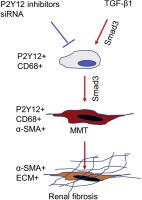Molecular Therapy ( IF 12.1 ) Pub Date : 2022-07-05 , DOI: 10.1016/j.ymthe.2022.06.019 Junzhe Chen 1 , Ying Tang 2 , Yu Zhong 3 , Biao Wei 3 , Xiao-Ru Huang 4 , Patrick Ming-Kuen Tang 5 , Anping Xu 6 , Hui-Yao Lan 4

|
Clopidogrel, a P2Y12 inhibitor, is a novel anti-fibrosis agent for chronic kidney disease (CKD), but its mechanisms remain unclear, which we investigated by silencing P2Y12 or treating unilateral ureteral obstruction (UUO) in LysM-Cre/Rosa Tomato mice with clopidogrel in vivo and in vitro. We found that P2Y12 was significantly increased and correlated with progressive renal fibrosis in CKD patients and UUO mice. Phenotypically, up to 82% of P2Y12-expressing cells within the fibrosing kidney were of macrophage origin, identified by co-expressing CD68/F4/80 antigens or a macrophage-lineage-tracing marker Tomato. Unexpectedly, more than 90% of P2Y12-expressing macrophages were undergoing macrophage-to-myofibroblast transition (MMT) by co-expressing alpha smooth muscle actin (α-SMA), which was also confirmed by single-cell RNA sequencing. Functionally, clopidogrel improved the decline rate of the estimated glomerular filtration rate (eGFR) in patients with CKD and significantly inhibited renal fibrosis in UUO mice. Mechanistically, P2Y12 expression was induced by transforming growth factor β1 (TGF-β1) and promoted MMT via the Smad3-dependent mechanism. Thus, silencing or pharmacological inhibition of P2Y12 was capable of inhibiting TGF-β/Smad3-mediated MMT and progressive renal fibrosis in vivo and in vitro. In conclusion, P2Y12 is highly expressed by macrophages in fibrosing kidneys and mediates renal fibrosis by promoting MMT via TGF-β/Smad3 signaling. Thus, P2Y12 inhibitor maybe a novel and effective anti-fibrosis agent for CKD.
中文翻译:

P2Y12 抑制剂氯吡格雷通过阻断巨噬细胞向肌成纤维细胞的转变抑制肾纤维化
氯吡格雷是一种 P2Y12 抑制剂,是一种治疗慢性肾病 (CKD) 的新型抗纤维化药物,但其机制仍不清楚,我们通过沉默 P2Y12 或治疗 LysM-Cre/Rosa Tomato 小鼠的单侧输尿管梗阻 (UUO) 来研究其机制氯吡格雷体内和体外。我们发现 CKD 患者和 UUO 小鼠中 P2Y12 显着增加,并与进行性肾纤维化相关。从表型上看,纤维化肾内高达 82% 的 P2Y12 表达细胞是巨噬细胞来源,通过共表达 CD68/F4/80 抗原或巨噬细胞谱系追踪标记 Tomato 进行鉴定。出乎意料的是,超过90%的表达P2Y12的巨噬细胞通过共表达α平滑肌肌动蛋白(α-SMA)经历巨噬细胞向肌成纤维细胞的转变(MMT),这也得到了单细胞RNA测序的证实。从功能上讲,氯吡格雷改善了 CKD 患者估计肾小球滤过率 (eGFR) 的下降率,并显着抑制 UUO 小鼠的肾纤维化。从机制上讲,P2Y12 表达是由转化生长因子 β1 (TGF-β1) 诱导的,并通过 Smad3 依赖性机制促进 MMT。因此,P2Y12的沉默或药理学抑制能够在体内和体外抑制TGF-β/Smad3介导的MMT和进行性肾纤维化。总之,P2Y12 在纤维化肾脏中由巨噬细胞高表达,并通过 TGF-β/Smad3 信号传导促进 MMT 介导肾纤维化。因此,P2Y12抑制剂可能是一种新型有效的CKD抗纤维化药物。











































 京公网安备 11010802027423号
京公网安备 11010802027423号